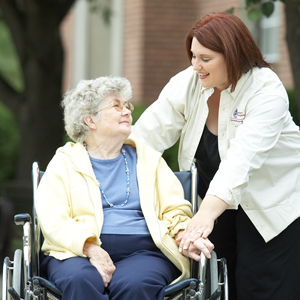Will I Develop Alzheimer’s Disease Too?
Blog | February 23, 2017
Caring for a loved one with Alzheimer’s disease can be emotionally, physically and mentally draining. It is also very common for caregivers and family members to worry about whether they will develop the disease themselves in the future.
The good news is that there is strong population-based evidence that certain lifestyle choices can reduce the risk of developing dementia by up to a half. These ‘modifiable risk factors’ are currently the best known defense against future cognitive decline. As such, good self-care is especially critical for those caring for family members with Alzheimer’s.
What Causes Alzheimer’s Disease?
The science around Alzheimer’s disease is rapidly evolving, as scientists gain a clearer understanding of the processes and risk factors involved in the development of the disease. This growing body of knowledge is paving the path to prevention, earlier detection, and new treatments.
The degenerative effects associated with Alzheimer’s disease are ultimately caused by the progressive destruction of nerve cells, which are thought to be damaged through a process that leads to accumulation of plaques and tangles in the brain. Ongoing studies are examining what triggers the process, how to halt the process at various points, and how to clean up or reverse the plaques and tangles to preserve nerve cells. For those at risk, prevention remains key.
Caring for a loved one with Alzheimer’s disease can be emotionally, physically and mentally draining. It is also very common for caregivers and family members to worry about whether they will develop the disease themselves in the future.
The good news is that there is strong population-based evidence that certain lifestyle choices can reduce the risk of developing dementia by up to a half. These ‘modifiable risk factors’ are currently the best known defense against future cognitive decline. As such, good self-care is especially critical for those caring for family members with Alzheimer’s.
Am I at Risk?
While there is no single known trigger or marker for Alzheimer’s disease, there are several factors that may influence the onset of the disease. The biggest known risk factor is simply age. One in nine people over 65 will develop Alzheimer’s, and this increases to one in three among those over 85, with women disproportionately affected (2/3). People who have a parent, brother or sister with Alzheimer’s are more likely to develop the disease than those who don’t. However in most cases, it remains unclear whether this increased familial risk is due to genes, environment, lifestyle, or a combination of those factors.
Ways to Reduce your Risk
Regular Physical Activity: Several studies have shown that adults who engage in regular physical activity through midlife are significantly less likely to develop Alzheimer’s disease and other dementias. Choose whole-body continuous activities that help develop and maintain balance, coordination, muscle and cardiac endurance.
Cardiovascular Health: A healthy brain depends on the continuous supply of oxygen and nutrients through a rich network of blood vessels. This supply can be compromised through various factors such as diabetes, obesity, hypertension, high cholesterol and smoking. These factors are also associated with higher risk of developing dementias such as Alzheimer’s disease.
Nutrition: There is no specific diet or nutrient that is known to lower risk of dementia, and products making such claims should be viewed with caution. Studies do show that nutrient-poor diets, and diets that are associated with increased risk of diabetes, obesity, high cholesterol and hypertension, are also associated with higher risk of dementia. Follow Canada’s Food Guide for a balanced diet that includes a variety of vitamins, minerals and healthy oils.
Use Your Brain: Keeping your brain active throughout life helps build reserves of brain cells and connections, and may even generate new brain cells. Learning new skills, taking a course, playing games, doing crosswords, producing art, reading, writing, and planning projects are all good brain-building activities that may prevent or significantly delay the onset of dementia.
Take Care of You
The science overwhelmingly shows that healthy lifestyle choices have strong preventive effects on the development of dementia. Unfortunately, it is common for the health of family caregivers to suffer as a result of the demands of caring for a loved one with Alzheimer’s. Finding the time to eat well and exercise your brain and body is your best defense against developing a variety of health issues, including dementia. Comfort Keeper’s offers a variety of support services that can allow caregivers to take the time to focus on self-care, including practical home support and companion care. Contact us today for a free in-home assessment of your needs.
Individualized Home Care Options
Long-Term Home Care, 24 Hour Home Care & Short Term Care Options Customized for You







